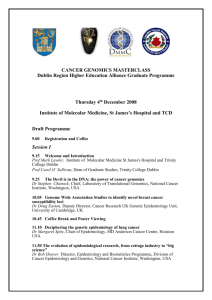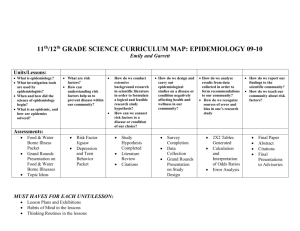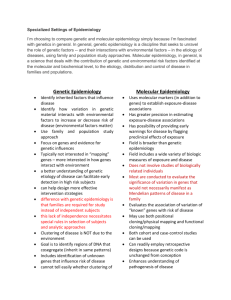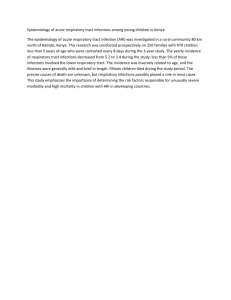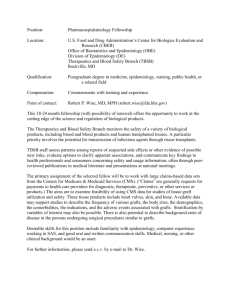EUROPEAN - ERS Annual Congress 2010
advertisement
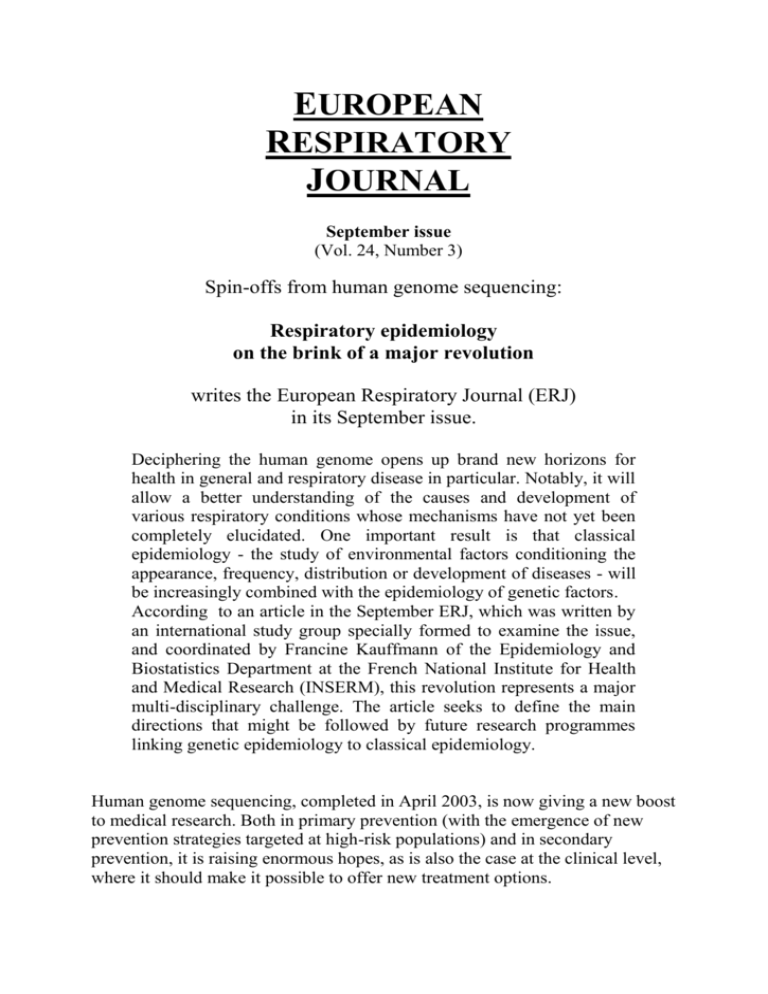
EUROPEAN RESPIRATORY JOURNAL September issue (Vol. 24, Number 3) Spin-offs from human genome sequencing: Respiratory epidemiology on the brink of a major revolution writes the European Respiratory Journal (ERJ) in its September issue. Deciphering the human genome opens up brand new horizons for health in general and respiratory disease in particular. Notably, it will allow a better understanding of the causes and development of various respiratory conditions whose mechanisms have not yet been completely elucidated. One important result is that classical epidemiology - the study of environmental factors conditioning the appearance, frequency, distribution or development of diseases - will be increasingly combined with the epidemiology of genetic factors. According to an article in the September ERJ, which was written by an international study group specially formed to examine the issue, and coordinated by Francine Kauffmann of the Epidemiology and Biostatistics Department at the French National Institute for Health and Medical Research (INSERM), this revolution represents a major multi-disciplinary challenge. The article seeks to define the main directions that might be followed by future research programmes linking genetic epidemiology to classical epidemiology. Human genome sequencing, completed in April 2003, is now giving a new boost to medical research. Both in primary prevention (with the emergence of new prevention strategies targeted at high-risk populations) and in secondary prevention, it is raising enormous hopes, as is also the case at the clinical level, where it should make it possible to offer new treatment options. Thanks to the knowledge gathered on the human genome, scientists are now better armed to stop the biological processes in their tracks at the origin of disease. But the revolution should be felt especially keenly in epidemiology. As the ERJ article emphasises, classical epidemiological data are not enough, and there is an urgent need for strategies that also integrate genetic data into public health programmes. One of the challenges of this post-genome period will thus be to provide adequate training so that epidemiologists with an interest in a particular disease (or in our case respiratory epidemiologists) are able to draw on all available data, connected both with the environment and with genetics. New theories on asthma This new genetic knowledge should prove particularly useful not only in understanding how respiratory diseases function, but also in identifying their causes. In this field, the authors consider current knowledge to be inadequate: if so much research has led to inconclusive results, the reason lies largely in the excessively restricted population samples habitually used in studies. "Population studies need to be based on large, well characterised samples in order to study certain sub-varieties of the disease under examination and gain a better understanding of the interactions among various genes and between genes and the environment", explains Francine Kauffmann, spokesperson for the ERJ group on "Post-Genome Respiratory Epidemiology". The example that springs to mind is that of asthma, a complex disease with multiple mechanisms that have not been clearly elucidated. Several genes are involved in the main asthmatic mechanism (allergy), but the condition is also associated with temporal and geographic variations that have nothing to do with genetics. The article's authors feel there is a need to go beyond the hypotheses currently proposed to explain the global growth in asthma rates, none of which really seems conclusive. They find that there needs to be rapid development of new theories on the various causes of asthma and more focused study of the various sub-types, of this particularly complex condition. The same needs to be done for COPD, especially chronic bronchitis and emphysema. While it is certainly evident that smoking is the number one risk factor, it is no less clear that genetic factors play a role. Here again, there is an urgent need to establish the roles of the genes already discovered and identify new ones. Difficult marriage The road ahead will still be a difficult one, with numerous obstacles and major challenges, the authors warn. On the purely practical level, the marriage between classical and genetic epidemiology will only be able to produce useful results if certain very specific conditions can be met. Future studies, for example, "should not only systematically gather the genetic profiles of participants; they should also be designed for adaptability to new developments in genetics", Kauffmann emphasises. Therefore, new standards and new recruitment methods will have to be defined. The development of Networks of Excellence at the international level, and especially at the European level, could pave the way for new multidisciplinary research programmes. The most delicate issue, however, is bound to be ethics. Scientists are increasingly interested in heterogeneous populations rather than the high-risk individuals they have focussed on up to now, therefore the very notion of ethics will need to evolve. "Most ethics codes have concentrated on individual rights (autonomy, consent, discrimination, confidentiality, etc.). The guidelines proposed no longer completely respond to the new issues raised by population banking studies. The development of normative frameworks appears necessary", the authors write. The post-genome period is certainly very promising, but there are immense challenges on the way to a better and more modern epidemiology.

